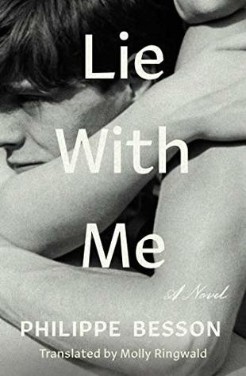1984
It’s the playground of a high school, an asphalt courtyard surrounded by ancient gray stone buildings with big tall windows. Teenagers with backpacks or schoolbags at their feet stand around chatting in small groups, the girls with the girls and boys with boys. If you look carefully you might spot a supervisor among them, barely older than the rest.
It’s winter.
You can see it in the bare branches of a tree you would think was dead planted there in the middle of the courtyard, and in the frost on the windows, and in the steam escaping from mouths and the hands rubbing together for warmth.
It’s the mid eighties.
You can tell from the clothes, the high-waisted ultra-skinny acid-wash jeans, the patterned sweaters. Some of the girls wear woolen leggings in different colors that pool around their ankles.
I’m seventeen years old.
I don’t know then that one day I won’t be seventeen. I don’t know that youth doesn’t last, that it’s only a moment, and then it disappears and by the time you finally realize it, it’s too late. It’s finished, vanished, lost. There are some around me who can sense it; the adults repeat it constantly but I don’t listen. Their words roll over me but don’t stick. Like water off the feathers of a duck’s back. I’m an idiot. An easygoing idiot.
I’m a student in terminal C at the Lycée Elie Vinet de Barbezieux.
Barbezieux doesn’t exist.
Or let’s put it another way. No one can say: “I know this place, I can point to it on a map,” except perhaps for the readers (and they are more and more rare) of Jacques Chardonne, a Barbezieux native who in his writing extolled the town’s implausible “happiness.” Or those (and they are more numerous) who have a memory of taking Route 10 to formally begin their vacation at the beginning of August, in Spain or in Les Landes, only to find themselves stuck there—precisely there—in bumper-to-bumper traffic, thanks to a succession of poorly thought-out traffic lights and a narrowing of the highway.
It is in Charente, thirty kilometers south of Angoulême. The limestone soil lends itself to the cultivation of vines, unlike the cold, clay soil of neighboring Limousin. It’s an oceanic climate, with mild and rainy winters. There isn’t always a summer. As far back as I can remember, it’s the gray that dominates, and the humidity. The remains of Gallo-Roman churches, and scattered chateaux. Ours looked like a fortified castle but what was there really to defend? Surrounding us there were hills. It was said the landscape undulated. That’s about it.
I was born there. Back then we still had a maternity ward, but it closed many years ago. No one is born in Barbezieux anymore, the town is doomed to disappear.
And who knows Elie Vinet? They claim he was Montaigne’s teacher though this fact has never been seriously established. Let’s say he was a humanist of the sixteenth century, a translator of Catullus and the principal of the College of Guyenne in Bordeaux. As luck would have it, that brought him to Saint-Médard, an enclave of Barbezieux. The high school was named after him. We didn’t find anyone better.
